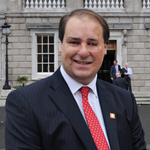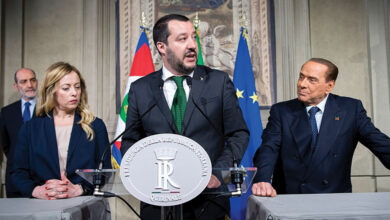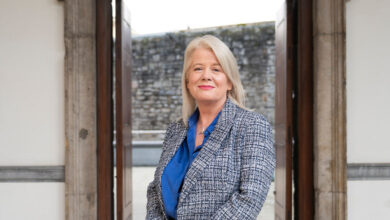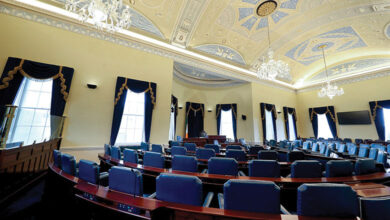Tough decisions in Labour
 Meadhbh Monahan discusses future plans and visions of a better government with former Labour TDs Patrick Nulty and Tommy Broughan.
Meadhbh Monahan discusses future plans and visions of a better government with former Labour TDs Patrick Nulty and Tommy Broughan.
The loss of three TDs in the space of one month is “regrettable”, according to the Labour Party.
Longford-Westmeath TD Willie Penrose resigned from the party on 15 November over the Government’s decision to close Columb Barracks in Mullingar, a move that he argued was “not backed up by the facts and figures.” He consequently resigned from his position as Minister of State with responsibility for housing and planning and was replaced by Jan O’Sullivan.
 Notorious rebel Tommy Broughan was next to go on 1 December after he voted against the Government on the Credit Institutions (Eligible Liabilities Guarantee) (Amendment) Scheme 2011 i.e. the extension of the bank guarantee scheme. The Dublin North East TD subsequently lost the party whip and went on to vote against the Budget, the Social Welfare Bill and the €100 household charge.
Notorious rebel Tommy Broughan was next to go on 1 December after he voted against the Government on the Credit Institutions (Eligible Liabilities Guarantee) (Amendment) Scheme 2011 i.e. the extension of the bank guarantee scheme. The Dublin North East TD subsequently lost the party whip and went on to vote against the Budget, the Social Welfare Bill and the €100 household charge.
Following celebrations on 29 October for Patrick Nulty’s by-election success in Dublin West, he voted against the Budget, describing it as “unfair” and not representative of “an approach that will bring the type of growth into the economy that’s required.”
 While Broughan made clear his opposition to a Labour-Fine Gael coalition from the outset, this was the third time that the party whip had been removed from him. Meanwhile, Nulty canvassed for a party which had committed itself to making tough decisions in order to restore the country’s economic growth. However, he contends that he made it clear during his by-election campaign that he stands for job creation and the retention of local frontline services in health and education. Therefore, he argues that his decision to vote against the Budget “was entirely in line with the mandate I received from the people who elected me.”
While Broughan made clear his opposition to a Labour-Fine Gael coalition from the outset, this was the third time that the party whip had been removed from him. Meanwhile, Nulty canvassed for a party which had committed itself to making tough decisions in order to restore the country’s economic growth. However, he contends that he made it clear during his by-election campaign that he stands for job creation and the retention of local frontline services in health and education. Therefore, he argues that his decision to vote against the Budget “was entirely in line with the mandate I received from the people who elected me.”
Interestingly, when asked what the party would do should the three TDs reapply for the party whip, a Labour spokesman told eolas: “Any applications for readmission to the parliamentary party would be considered on their merits. It is worth noting that while Deputies Nulty and Broughan have repeatedly voted against the Labour Party, Deputy Penrose has not.”
Contacted by eolas to discuss his future plans, Penrose refused to comment, saying: “I’ve done my time on it.”
Alternatives
Nulty was more transparent, saying: “I voted against the Budget because I believe that, rather than helping to create jobs and build a sustainable and equal economy, it would make that task more difficult.”
The moves to cut 5,965 public sector jobs, increase VAT, impose a household charge and cut DEIS (delivering equality of opportunity in schools) are regressive policies, and capital and wealth taxes would have been preferable, he believes.
Following his expulsion from the Labour parliamentary party, he outlined his alternatives in the Irish Mail on Sunday.
These are: increasing taxation on high-income groups; reinvesting the expected €500 million savings from public sector reform into improving public services; increasing investment levels by using the €15 billion in the Pension Reserve Fund; and ending the re-payment of €80 billion in Anglo Irish Bank debts. “Nobody has come out and disagreed with any of the analysis I have been putting forward,” he states.
“I think people realise the argument [I am] making is about trying to drive a change of policy in the country. I would have preferred to vote for a Budget that was pro-jobs, that protected frontline services in health and education and that asked those who have most to pay most,” Nulty continues.
When it is put to Nulty that some (such as Billy Lenihan writing in the Irish Times on 8 December) would see him as an opportunist, he responds: “Nobody’s ever going to agree with my decision 100 per cent, but I think even those who don’t agree with my position to vote against the Budget will respect where I am coming from.”
The practicalities of his decision include moving seats in the Dáil, moving offices and no longer being allowed to attend parliamentary party meetings. Now an independent TD, Nulty argues that this does not diminish his capability to “be a strong voice for the people.”
Asked if he would reapply for the party whip, Nulty tells eolas: “I’m still a member of the Labour Party and intend to be a member of the Labour Party for a very long time. I work very closely with local activists in Dublin West and right across the country.” A debate is needed within the party, with the trade unions “and right across civil society” against cuts to frontline services, he insists.
Overall, the party whip system is “too strict”, according to Nulty. When challenged that a three-line whip is standard for a finance bill (because a general election can be called if a government fails to get a majority), he responds: “It’s precisely because the Finance Bill is such a serious matter that I believe I had to take a stand on it.”
Broughan recalls that the entire Labour Party voted against the first bank guarantee scheme in 2008. He didn’t feel that anything had changed in the intervening years. “In particular, I felt that it was outrageous that the European Central Bank wasn’t directly involved in guaranteeing its own currency,” he tells eolas. He concedes that, since the ECB is supporting our banks, some would argue that it is guaranteeing the euro, but adds: “I felt that something fundamentally different should be in the legislation.”
Instead of the current coalition, Broughan would have preferred to be “the key opposition” until an early general election. He would also like to see the rest of the Labour Party cross the floor and join him on the opposition benches. When asked if this a realistic option, Broughan points to Dick Spring’s decision to leave a Labour-Fianna Fáil coalition in 1994 and join with Fine Gael under John Bruton.
“There are three of us now in a sort of limbo situation and I would hope that more would follow suit,” he tells eolas.
Despite voting against the party, Broughan says he gets on well with all 38 members of the parliamentary party. He admits moving offices, to the Department of Agriculture’s buildings (along with the Technical Group), has been “a bit awkward” for his staff.
“When you come into the Oireachtas, ultimately, you are representing the country and I think the policy embarked on by the Fianna Fáil-Green government was utterly misconceived, effectively returning vast sums of Irish tax-payers’ money to institutions which were gambling on the stock exchange,” he states.
He points to the fact that Ireland is unable to return to the markets, commenting: “The situation remains as grave as when the last Government was in power therefore, from the point of view of the people, I believe I did the right thing.”
The Labour spokesman conceded that “it is regrettable to lose any members of the parliamentary party”, either through them voting against the party in the Dáil, or by offering their resignation to the party whip. However, he was adamant that as part of the Government, “the Labour Party will not be deflected from the tough job of building the foundations of economic recovery for this country.”





